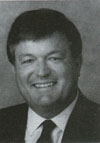Volume 29, Number 5 September/October 1998
ACROSS THE BOARDVolunteerism Builds AmericaLike the spirit of today's volunteer park board members, we must foster a commitment to volunteerism for the future of our communities
But Scioscioli went on to say that the widespread volunteerism in this country is very closely linked with our form of government. Scioscioli said: "[Volunteerism] is an immediate expression of the very solid roots of democracy in this country... it is difficult to be a volunteer when you do not have faith and trust in the institutions of your country. He said the diverse groups involved in volunteer activities are part of a pluralistic society that makes democracy work and that it is very difficult to find this variety in any European country There are many things that we take for granted in America, and volunteerism is one of them. We need to recognize our park district, forest preserve and recreation board members and thank them for the thousands of hours of dedicated service they contribute each year to their communities. How do we continue to foster volunteerism in our communities? Who will be our future board members? Where will the volunteers come from for our recreational services? Will the next generation be as responsive to community needs and volunteerism? Why not propose 80 hours of volunteer service work for all students to be performed sometime between the eighth grade and high school graduation? Could we not develop a program that would instill a sense of community in our young people? If France can require one year of military service for youngsters, why can't we require 80 hours of community service? Isn't volunteerism the backbone of American society? Was not America built and continues to prosper on volunteerism? The potential benefits of such a program could be substantial. Playgrounds can be cleaned up. Our creeks and natural areas could become litter-free. Senior citizens could be assisted. Intergenerational programs could flourish. Teen services could be improved. A multitude of community service projects could generate from such a program. Perhaps some of the youngsters who have experiences like this (during the summer months or weekends) will find a career in advocacy that will benefit them personally and certainly look good on their resumes at a later date. Others might not find a vocation, but will learn more about themselves. Volunteerism is alive and well in America. But are we adequately preparing future
generations for volunteerism? Will Americans continue to volunteer to promote our way of life? ž
|
September / October 1998 | 5
